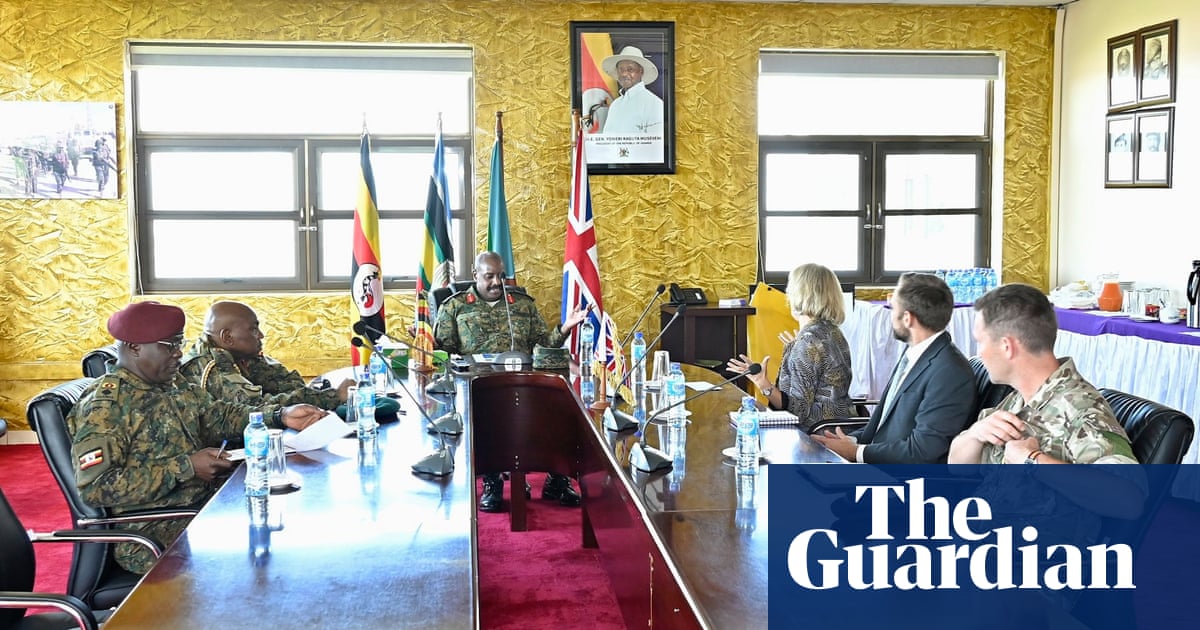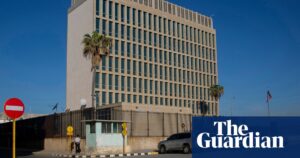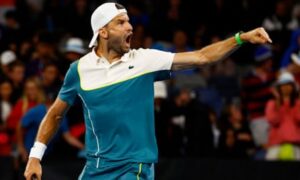
Senior British government officials have congratulated the newly appointed head of the Ugandan army, a man accused of torture, in a move that has been called “absurd” and “disappointing”.
Gen Muhoozi Kainerugaba, Uganda’s new chief of defence forces and son of President Yoweri Museveni, received a congratulatory letter from Britain’s most senior military officer, Adm Sir Tony Radakin, at a meeting with the British high commissioner, Kate Airey, and the British defence attache.
Kainerugaba and Museveni, who has ruled Uganda since 1986, have been accused of sponsoring violence and abusing critics. A dossier of evidence detailing allegations of torture and arbitrary arrests was filed to the international criminal court in July last year. Both have denied the claims.
“It’s really very absurd,” said Kakwenza Rukirabashaija, an award-winning satirical writer, who says he was tortured in prison and is now in exile because his work humiliated Museveni.
“With the situation in Uganda and the systematic rights abuses, we need to depend on foreign stakeholders – the British, the EU, the US – to exercise their extraterritorial obligations. I look at this as if the UK is condoning, and in agreement with, what Gen Kainerugaba is doing.”
Amos Katumba, an associate of the opposition leader Bobi Wine, who runs the children’s charity Caring Hearts Uganda and is involved in the ICC case, said: “I’m so disappointed because we are talking about allegations involving kidnappings, abductions, torture and killings of innocent Ugandans. My question is: what is the UK congratulating him for?”
Andrew Mwenda, Kainerugaba’s spokesperson, said: “Gen Kainerugaba does not believe in violation of human rights as a principle, so he cannot be involved in any violations of people’s rights.”
Shortly after the meeting between Kainerugaba and the British envoys, the UK imposed sanctions on three Ugandan politicians, including the speaker of parliament, over corruption charges.
Lawyers and researchers welcomed the sanctions as sending a strong message but questioned why other human rights abuses, such as election-related violence and last year’s anti-LGBTQ law, which includes the death penalty for certain same-sex acts and imprisonment for “promoting” homosexuality, do not merit the same approach.
“You can’t focus on one set of human rights abuses and ignore another set,” said Oryem Nyeko, a researcher at Human Rights Watch. “It would be great if Uganda’s partners – anybody who has a vested interest in human rights in Uganda – could take a holistic stance. It’s about human rights as a whole as opposed to certain facets.”
Uganda is a key western ally in Africa, and has received billions of pounds of security and development assistance from Britain and US. It has emerged as a major hub of the gold trade in the region; in 2022 the precious metal was the most exported product. It is seen as an anchor state in championing economic and political integration across east Africa.
The meeting between UK government officials and Kainerugaba may damage the global north’s reputation as standing up for human rights, according to activists.
“The UK is legitimising and giving new life to a repressive regime. Human rights will worsen under Kainerugaba’s leadership of the army,” said Andrew Karamagi, a Ugandan lawyer. “By cosying up to people like Kainerugaba, you worsen your image in countries like Uganda and beyond.”
A spokesperson for Britain’s Ministry of Defence and Foreign Office said: “It is standard protocol for the chief of the defence staff to write to incoming chiefs of defence of other nations.
“The UK engages with all levels of the Ugandan government on shared interests, including the Uganda People’s Defence Force’s deployment to the African Union transition mission in Somalia, to which Uganda is the largest troop-contributing country.”
Source: theguardian.com

















